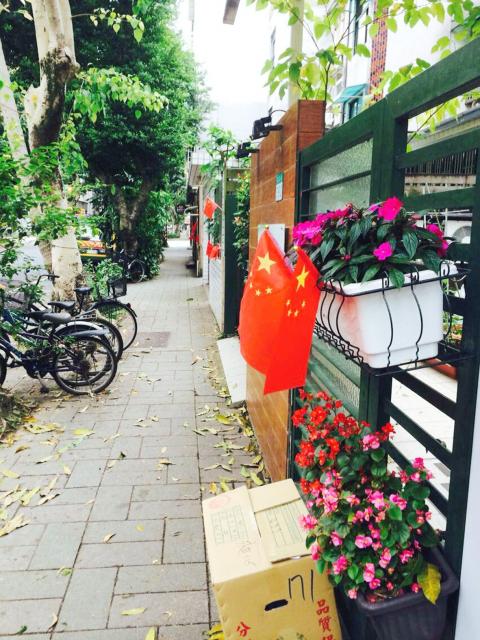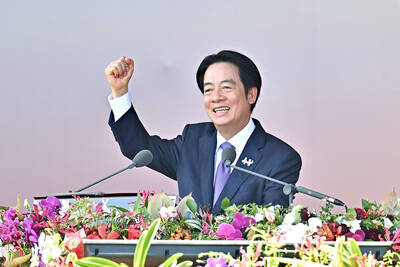The residents of a neighborhood in Taipei’s Songshan District (松山) woke up on Monday morning to the perplexing sight of hundreds of Chinese national flags blanketing several city blocks around Fu Jin Street (富錦街).
The slew of small yellow-starred red flags were tucked into mailboxes, draped over fences, adorning storefronts, planted in flower beds, and hung from trees and hedges lining the street.
A Songshan resident surnamed Fang (方) said he was out doing his morning exercises at about 5am on Monday when he saw the flags.

Photo courtesy of a member of the public
The flags’ plastic poles bore the message: hua du jian tong (化獨漸統), which means “Turn [Taiwanese] independence into gradual unification [with China].”
Many residents said they were alarmed by the political symbolism of the Chinese flags and joined in the efforts to remove the unusual street decorations.
Some of the people at the scene posted photographs of the street on social media sites, sparking anxiety and outrage among netizens.
“Are we unified with China already?” one commentator asked, while another queried: “Has this street been sold to China?”
Other netizens mocked the nation’s political leaders, saying that the politicians were selling Taiwan out to China.
“Is it not enough for the President [Ma Ying-jeou (馬英九)] to have a red Chinese flag in his heart?” one person commented.
“I won’t be surprised to see the five-star red flag being flown at the Presidential Office Building one day,” they added.
On the same morning, there were reports of Chinese flags along Yung Kang Street (永康街) in Taipei’s Daan District (大安).
After reviewing surveillance camera footage yesterday, the police said that three women with their faces covered by medical masks had been captured on film planting the flags.
The three suspects were filmed carrying tote bags as they walked along Fu Jin Street at approximately 3:30am on Monday, planting the flags as they moved briskly along.
A Taipei City Police Department official said that since the distribution of pamphlets, advertisements and flags is covered under laws protecting freedom of speech, the department does not usually interfere in the dissemination of such materials, unless it results in the obstruction of traffic.
However, the official added that when an excessive volume of material is distributed, the Environmental Protection Agency is asked to send a cleaning crew.
Lu Shih-chang (盧世昌), Deputy Director of the agency’s Taipei office, said that if items like the flags are placed on public property, sidewalks or streets, the person responsible can be fined between NT$1,200 and NT$6,000 under the Waste Disposal Act (廢棄物清理法).

The Ministry of the Interior (MOI) is to tighten rules for candidates running for public office, requiring them to declare that they do not hold a Chinese household registration or passport, and that they possess no other foreign citizenship. The requirement was set out in a draft amendment to the Enforcement Rules of the Public Officials Election and Recall Act (公職人員選舉罷免法 ) released by the ministry on Thursday. Under the proposal, candidates would need to make the declaration when submitting their registration forms, which would be published in the official election bulletin. The move follows the removal of several elected officials who were

FOUR DESIGNATED AREAS: Notices were issued for live-fire exercises in waters south and northwest of Penghu, northeast of Keelung and west of Kaohsiung, they said The military is planning three major annual exercises across the army, navy and air force this month, with the navy’s “Hai Chiang” (海強, “Sea Strong”) drills running from today through Thursday, the Ministry of National Defense said yesterday. The Hai Chiang exercise, which is to take place in waters surrounding Taiwan, would feature P-3C Orion maritime patrol aircraft and S-70C anti-submarine helicopters, the ministry said, adding that the drills aim to bolster the nation’s offshore defensive capabilities. China has intensified military and psychological pressure against Taiwan, repeatedly sending warplanes and vessels into areas near the nation’s air defense identification zone and across

SENATE RECOMMENDATION: The National Defense Authorization Act encourages the US secretary of defense to invite Taiwan’s navy to participate in the exercises in Hawaii The US Senate on Thursday last week passed the National Defense Authorization Act (NDAA) for Fiscal Year 2026, which strongly encourages the US secretary of defense to invite Taiwan’s naval forces to participate in the Rim of the Pacific (RIMPAC) exercise, as well as allocating military aid of US$1 billion for Taiwan. The bill, which authorizes appropriations for the military activities of the US Department of Defense, military construction and other purposes, passed with 77 votes in support and 20 against. While the NDAA authorizes about US$925 billion of defense spending, the Central News Agency yesterday reported that an aide of US

NATIONAL DAY: The ‘Taiwan Dome’ would form the centerpiece of new efforts to bolster air defense and be modeled after Israel’s ‘Iron Dome,’ sources said President William Lai (賴清德) yesterday pledged to strengthen the nation’s air defense capabilities and build a “T-Dome” system to create a safety net against growing military threats from China. “We will accelerate our building of the T-Dome, establish a rigorous air defense system in Taiwan with multi-layered defense, high-level detection and effective interception, and weave a safety net for Taiwan to protect the lives and property of citizens,” he said in his National Day address. In his keynote address marking the Republic of China’s (ROC) 114th anniversary, Lai said the lessons of World War II have taught nations worldwide “to ensure that